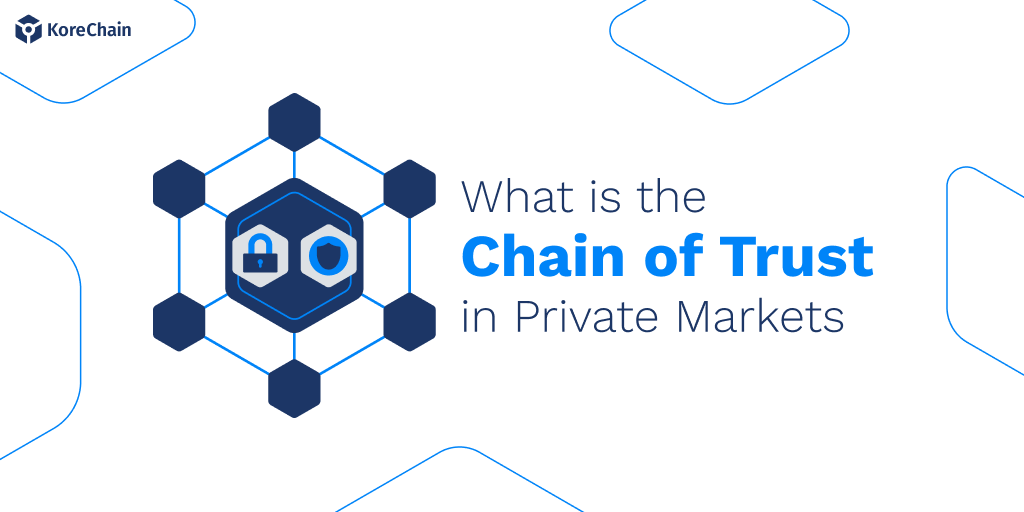In the context of private markets, the concept of “Chain of Trust” refers to a network of trusted relationships among participants involved in private market transactions. It encompasses the various parties and intermediaries, such as investors, companies, brokers, and regulators, who rely on each other to ensure the integrity and security of transactions.
The Chain of Trust is crucial in private markets because these transactions often involve substantial amounts of capital, sensitive information, and complex agreements. Establishing a reliable Chain of Trust helps to foster transparency, mitigate risks, and build confidence among participants.
Here are a few key aspects of the Chain of Trust in private markets:
- Investor Trust: Private market investors, such as institutional investors, venture capitalists, and private equity firms, place significant reliance on the information and representations provided by the companies seeking capital. They need to trust that the financial data, business projections, and other relevant information are accurate and reliable.
- Due Diligence: Investors and other participants in private markets perform extensive due diligence to evaluate investment opportunities. This involves conducting thorough research, verifying information, and assessing the credibility and track record of the parties involved. A reliable Chain of Trust ensures that accurate and up-to-date information is available for evaluation.
- Intermediaries and Service Providers: Various intermediaries play a role in private market transactions, such as investment banks, law firms, accounting firms, and regulatory bodies. These entities help facilitate the transaction process, provide expertise, and ensure compliance with legal and regulatory requirements. Establishing trust in these intermediaries is crucial for maintaining the integrity of the Chain of Trust.
- Regulatory Compliance: Private markets operate within a regulatory framework that aims to protect investors and maintain market integrity. Regulators play a vital role in enforcing rules and regulations, ensuring fair practices, and overseeing compliance. Trust in regulatory bodies is necessary to maintain confidence in the overall Chain of Trust.
- Data Security and Privacy: Private market transactions involve sensitive and confidential information. Participants must have trust in the security measures implemented to protect their data from unauthorized access, breaches, or misuse. Robust cybersecurity protocols and data privacy practices are essential for maintaining trust in the Chain of Trust.
In all business transactions, trust requires not only the provable trustworthiness of individual participants and entities but also the provable trustworthiness of transactions between them.
A Chain of Trust allows the dissemination of information for verified Issuers (Companies) and their live offerings and removes all risks associated with the fraud.
Chain of Trust
The Chain of Trust in the Infrastructure of Trust collects trusted and regulated information about the participants and their transactions with investors and partners in offerings. This information is cryptographically secured on the KoreChain to bring Trust to the Private Markets.
Each participant can view the information and see the source that is now hosted on an immutable infrastructure.
As the information is collected from regulated sources and verified it now becomes part of the chainlink as it creates TRUST in the private capital markets.
- Verification of information
- Verifies each of the participants
- The Issuer with CIK#
- FINRA Broker-Dealer CRD#, CIK#, SEC#
- FINRA Registered Funding Portal CRD#, CIK#, SEC#
- SEC-Registered Transfer Agent CIK#
- Escrow Bank
- Law Firm
- Auditors
- SEC Offering Link
KoreID
KoreID revolutionizes trust in private markets by providing a digital identity to essential entities, ensuring all participants are verified and transactions are secure.
By enabling a seamless verification process, KoreID ensures that each participant and transaction adheres to the highest standards of trustworthiness and compliance
All of the following entities are provided a KoreID after verification:
- Issuer
- FINRA-registered Broker-Dealer
- FINRA-registered funding portal
- Law Firm
- Audit Firm
- SEC-Transfer Agent
- Escrow Bank
- The Offering by an Issuer
KoreID Verified
KoreID Verified offers an extra layer of security, specifically verifying transactions and participants in private market offerings, enhancing the ecosystem’s integrity.
The issuer is provided KoreID Verified for this specific offering and regulated participants
The KoreID and KoreID Verified play an important role when the Issuer wants to use Newswire Dissemination to reach the general public.
Resources in Focus
Newswire
By accessing the KoreID of the Issuer (Company), the Newswire team will be able to see if the company is real and review the principals, management, and board members. This reduces the risk of disseminating news to fake Issuers.
If the Issuer announces financing, the Newswire can view the KoreID Verified and review all the necessary information
Media Outlets
The KoreID and KoreID information is provided to the media outlets who can include that in their content. This enables the general public to view the information about the company and its offering, verify it, and have confidence in the information posted on their media outlets. The Chain of Trust is navigable so that the investor can trace the origin of the information and review the trustworthiness of the information handlers and disseminators.
General Public
The general public will see the KoreID and KoreID Verified which will provide information for them to view, similar to an SSL Certificate. This transparency gives the general public confidence in the company and its offering.
Overall, the Chain of Trust in private markets is built on transparency, credibility, due diligence, and regulatory compliance. Establishing and maintaining a strong Chain of Trust fosters a healthy and vibrant private market ecosystem where participants can confidently engage in transactions and allocate capital effectively.






 Back to Blog
Back to Blog